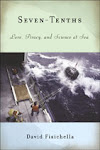Another year and another tax deadline has passed with expected results – we owe. Ever since starting a business almost 15 years ago I've become accustomed to seeing the red digits of Turbo Tax's tally of my contribution to the National Balance Sheet flash across the screen. In all those years I have never been able to reconcile the fact that a fluctuating income requires constant re-evaluation of quarterly payments to the IRS. It was bad enough having to confront profit and loss annually. The thought of doing it four times a year was distasteful. Needless to say I would minimize the effort by using a method that Allen Greenspan would describe as "generalizing recent market conditions in a manner that would result in a favorable monetary outcome based on emotionally derived data.." That is to say – I guessed.
After a first-pass calcualtion based on last years "estimated" withholding's I rubbed salt into an already painful wound by finding a hand-written 1099 sent by my agent. It was, in essence, income (albeit very little) that had no withholding taken from it, resulting in an even higher tax liability. My tax software was very compassionate and understanding, prodding me to "think about any expenses that may off-set your income".
Someone once asked me, when did I consider myself a writer? I replied that it was a moving target. First there was completing a manuscript, then it was only after I held a printed copy of my book, next was when a warm body unrelated to me had purchased a copy. Sitting there at my computer I realized that the target had moved yet again. Real writers can deduct writing expenses! But what constitutes a writing expense? By the definition of the IRS "Anything that is necessary for the creation and /or delivery of goods and services."
Let's see...paper, pens, printer ink, easily justified. Home office..check, copies..check, one honk'in big dictionary (see previous post), check As I entered these deductions I could see the red number on the screen dropping as fast as Enron stock. This was good, but I was running out of things associated with the mechanics of writing. I needed to be more creative. That was all it took. After all, what is the largest component of a writer's product? Creativity. The creative process, one of the most intangible things on the planet, and I was on a quest to figure out how to deduct it. Office chair? No. Comfy office chair? Yes. Morning $4 latte to stimulate new ideas? Yup. Trip to exotic beach to research unused description of rare sand crab in chapter three? Definitely.
Writing is a goldmine of deductions. This explains why there are so many books out there – everyone can write, or at least try to write, so why not take advantage of Uncle Sam's generosity in the tax code? I take comfort in knowing that as a writer I belong to that triumvirate of professions (including musician and large U.S. automaker) in which the IRS does not expect you to earn a profit.
I'm writing this post from a ranch in Arizona where we have taken Sara for school vacation. I suspect my next entry will be an essay about ranches in Arizona. As you can see I'm already planning my tax strategy for next year.
Monday, April 26, 2010
Wednesday, April 7, 2010
Spell Check - An Evil Tool
Let me start by admitting that I'm a terrible speller. In grade school I was always first-round knockout material in the spelling bee, stumbling over the simple words like breth and allready. I would go so far as to change a word in a sentence rather than risk getting it wrong. Things didn't improve in later years, when I was confronted with the added burden of writing book reports and papers containing even more words. This was when I discovered that I'm also a terrible editor. I see what my brain expects me to see. If I wrote "vassal" when I meant to write "vessel", no amount of review would expose the mistake.
The inability to spell or edit the written word makes for a poor foundation for a budding writer. Creativity and vocabulary can only make up for so much of the "fingernails on the chalkboard" reaction to repeated spelling mistakes. Errors of any form tend to derail the reader's involvement in a story, which is why I saw the advent of spell-check as my literary savior. Not only did my digital English teacher point out my mistakes, but she corrected them for me as I was typing, leaving me free to unleash a torrent of words as fast as my fingers could butcher them. No longer having to worry if "I" came before "E" regardless of where the letter "C" happened to be hanging out. It was like being free of the times tables after the invention of the calculator.
As with the fallacy of a free lunch, users of spell-check must pay the price for its convenience. This payment comes in the form of blissful ignorance - with no little red squiggles underlining my text, I saved the document knowing that every word on the page had been vetted for accuracy by my personal expert speller. It was not until my manuscript had past the point of no return, printed, bound and distributed that one reviewer pointed out today that "Fisichella did make the common mistake in his book of referring to a 'principle investigator' instead of a principal investigator'." Ouch! The question now is, short of a personal phone call, how do I make every reader understand that it was the fault of the little man in the box, not me. I know the whole 'principal is your pal' thing, but somehow I don't think anyone will believe me. Especially anyone who had seen my third grade spelling tests.
The inability to spell or edit the written word makes for a poor foundation for a budding writer. Creativity and vocabulary can only make up for so much of the "fingernails on the chalkboard" reaction to repeated spelling mistakes. Errors of any form tend to derail the reader's involvement in a story, which is why I saw the advent of spell-check as my literary savior. Not only did my digital English teacher point out my mistakes, but she corrected them for me as I was typing, leaving me free to unleash a torrent of words as fast as my fingers could butcher them. No longer having to worry if "I" came before "E" regardless of where the letter "C" happened to be hanging out. It was like being free of the times tables after the invention of the calculator.
As with the fallacy of a free lunch, users of spell-check must pay the price for its convenience. This payment comes in the form of blissful ignorance - with no little red squiggles underlining my text, I saved the document knowing that every word on the page had been vetted for accuracy by my personal expert speller. It was not until my manuscript had past the point of no return, printed, bound and distributed that one reviewer pointed out today that "Fisichella did make the common mistake in his book of referring to a 'principle investigator' instead of a principal investigator'." Ouch! The question now is, short of a personal phone call, how do I make every reader understand that it was the fault of the little man in the box, not me. I know the whole 'principal is your pal' thing, but somehow I don't think anyone will believe me. Especially anyone who had seen my third grade spelling tests.
Subscribe to:
Posts (Atom)

